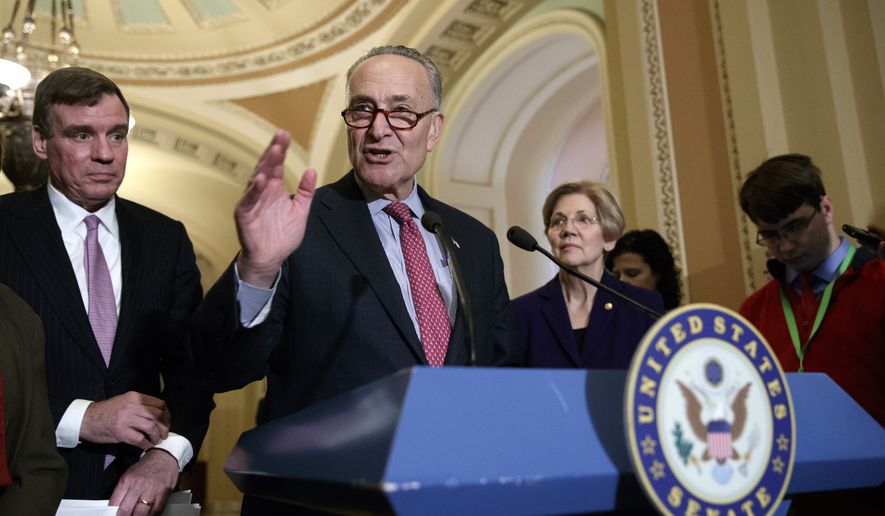Senate Minority Leader Charles E. Schumer said Thursday that Democrats will attempt to filibuster Judge Neil Gorsuch’s nomination, setting up a major test for Republicans, who may now have to confront whether to trigger the “nuclear option” to get the judge onto the Supreme Court.
As confirmation hearings for the judge ended Thursday, Mr. Schumer pronounced judgment on him, saying that while the judge met all the legal qualifications, he wasn’t the liberal judge Republicans prevented President Obama from nominating in his final year.
A handful of other Democrats rushed to join Mr. Schumer, saying they, too, are prepared to mount a partisan filibuster — for just the second time in U.S. history — to try to block a Supreme Court nominee.
“Judge Gorsuch was unable to sufficiently convince me that he’d be an independent check on a president who has shown almost no restraint from executive overreach,” Mr. Schumer said. “Second, he was unable to convince me that he would be a mainstream justice who could rule free from the biases of politics and ideology.”
President Trump, who nominated Judge Gorsuch, has loomed large over the whole debate, with Democrats saying the newly elected president is too tainted to be allowed to pick a replacement for the late Justice Antonin Scalia.
Democrats are also still smarting after President Obama’s pick for the seat, Judge Merrick Garland, was denied a confirmation hearing, much less a vote, by Republicans who wanted the Supreme Court to be a campaign issue.
QUIZ: SCOTUS 101: How much do you know about the Supreme Court?
If Democrats are able to muster the votes for a filibuster, it will put pressure on Republicans to pull use the so-called nuclear option, a shortcut to change the rules and curtail the filibuster.
Democrats went nuclear four years ago, changing the rules to eliminate filibusters for all other nominations, but left the Supreme Court process intact.
Mr. Schumer, New York Democrat, backed that 2013 effort but now says Republicans shouldn’t follow his lead.
“The answer isn’t to change the rules; it’s to change the nominee,” he said in a floor speech Thursday.
It’s a reversal from last year, when then-Minority Leader Harry Reid, a Nevada Democrat confident of victories in the Senate and the White House, said his party would trigger the nuclear option to get Hillary Clinton’s nominee cleared.
“It takes only a simple majority anymore,” Mr. Reid, who has since retired, told Talking Points Memo, predicting the looming fight. “I did it in changing the rules of the Senate. It’ll have to be done again.”
PHOTOS: Best states for concealed carry — ranked worst to first
Instead, Democrats are mounting the filibuster and Republicans are pondering a rules change.
Senate Majority Leader Mitch McConnell, Kentucky Republican, has not tipped his hand on whether he will use the nuclear option, but has said flatly that Judge Gorsuch will be confirmed.
Judiciary Committee Chairman Chuck Grassley, who oversaw four days of hearings this week on Judge Gorsuch, said he delivered a “brilliant” performance that confounded Democrats under pressure from their liberal base to filibuster.
“If you’d filibuster Judge Gorsuch, it’s obvious you’d filibuster anybody,” Mr. Grassley said.
The Iowa Republican said Mr. Schumer, who has long been the leading proponent of evaluating judges not by their legal qualifications but by their ideology, is taking the Senate in a dangerous direction with his filibuster vow.
Of the eight current justices, only Justice Samuel A. Alito Jr. had to survive a partisan filibuster. He easily cleared that hurdle on a 72-25 vote — though Mr. Schumer, then-Sen. Barack Obama and then-Sen. Hillary Clinton were all part of that filibuster.
Neither of Mr. Obama’s two nominees to the high court faced filibusters by Republicans.
Overcoming a filibuster requires 60 votes. Republicans have 52 seats in the chamber, so if all of them back the judge — which is expected — they would still need eight members of the Democratic caucus to join them.
Some Democrats on Thursday signaled they may be willing.
Sen. Angus King of Maine, an independent who caucuses with Democrats, said he will make his own decision independent of Mr. Schumer. Sen. Joe Manchin III, West Virginia Democrat, told Yahoo news that he won’t join the filibuster.
Both Mr. Manchin and Mr. King are up for re-election next year.
So, however, is Sen. Bob Casey, who said he will vote to oppose Judge Gorsuch.
“I have serious concerns about Judge Gorsuch’s rigid and restrictive judicial philosophy,” Mr. Casey said.
He said two of Judge Gorsuch’s rulings stood out.
In one of those cases the judge ruled against a disabled child’s demand that the public school system pay for special education. Judge Gorsuch said he was following his circuit court’s precedent, but the Supreme Court, in a unanimous decision Wednesday, rejected the legal test Judge Gorsuch and a number of other courts had used.
In the other case, the judge ruled that the law allowed a trucking company to fire a driver who abandoned his load after fearing he was freezing to death waiting in his stuck rig.
Judge Gorsuch said in that ruling he was following the law, though the outcome was troubling. He said, though, that he had to enforce the law as written and that it was up to lawmakers to rewrite it.
Mr. Schumer also cited those cases and others, saying that given Judge Gorsuch’s “lack of candor” in answering questions during two days of hearings this week, all senators have to go by is the judge’s record.
“We do not want judges with ice water in their veins,” he said.
• Stephen Dinan can be reached at sdinan@washingtontimes.com.
• Alex Swoyer can be reached at aswoyer@washingtontimes.com.




Please read our comment policy before commenting.